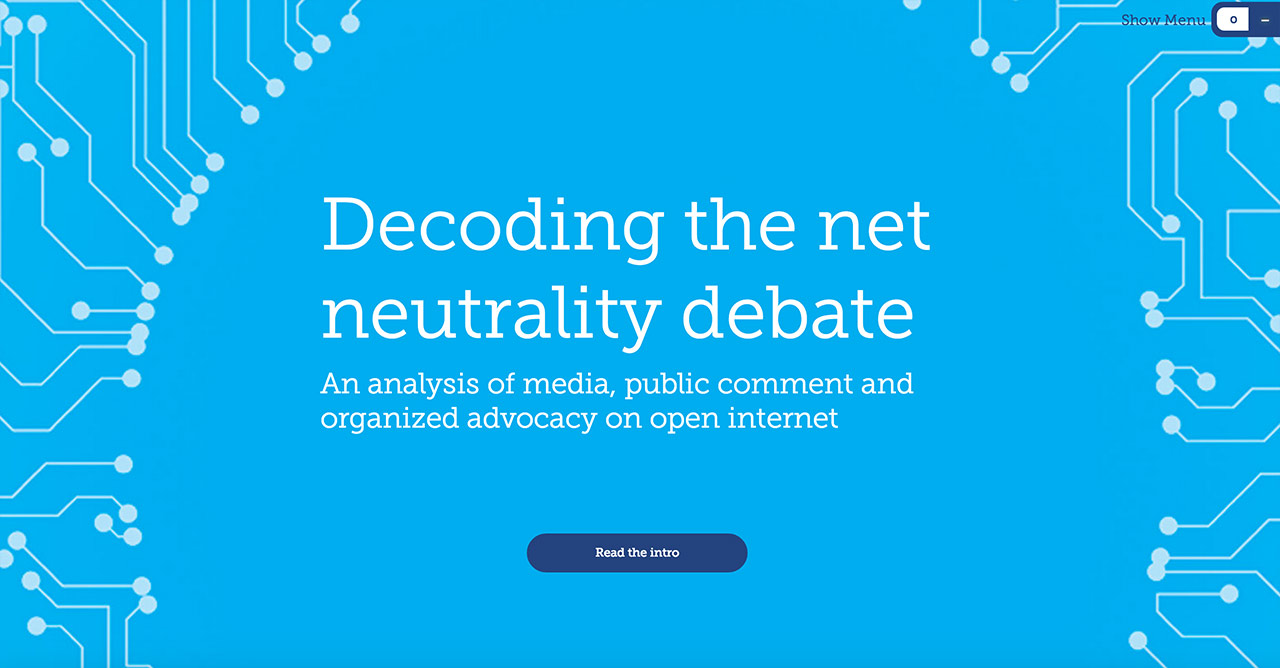
New report analyzes the net neutrality debate
Today we’re releasing “Decoding the Net Neutrality Debate: An Analysis of Media, Public Comment and Advocacy on Open Internet.” Related Links
Browse the PDF report on Slideshare.net
“New report uses data to reveal fresh insights into net neutrality debate” – Press release (12/11/2014)
The technical complexity of Internet regulation, and lack of direct historical precedent, make it difficult to engage the public in an informed debate and develop regulations that will remain effective over time. To tackle these challenges, both policymakers and citizens need to better understand public opinion. Knight Foundation partnered with Quid, a data analytics firm, to facilitate that understanding.
The debate may be one of the most important of our day. Companies that have invested billions in Internet infrastructure contend that they need the ability to manage their networks, prioritizing some content over others to maintain service, and charging for higher speeds.
Advocates of net neutrality see the Internet as a utility, essential for individual learning, civic participation and free expression, as well as economic competition and innovation—too important to have fast lanes and slow lanes, with the fastest speeds going to the highest bidder.
The debate intensified this year when the Federal Communications Commission invited public comment on new proposed regulations that stop short of the standards demanded by net neutrality advocates. The call elicited 3.7 million comments, a storm of debate on Twitter and an avalanche of press coverage.
Quid’s analysis shows that public opinion was overwhelmingly pro net neutrality, while the main narratives expressed on Twitter and in FCC comments favored egalitarians and fairness: Don’t create an Internet of haves and have-nots; treat the Internet like a utility, available for all. Net neutrality was also viewed as essential for startups to succeed against established companies.
Telecommunications and cable companies chose lobbying over public debate. They appeared to make only limited efforts to sway public opinion through traditional and social media, instead pouring significant amounts of money into lobbying. Their main narrative focused on the enormous bandwidth used by content providers such as Netflix, who should not get a “free lunch.”
The analysis raises several provocative questions about the future of the open Internet and policy decisions.
· Since the public voice that has participated in the conversation has overwhelmingly supported net neutrality, how will that affect the final decisions made by the Federal Communications Commission and political leaders?
· The debate has also been dominated by men and a handful of major metropolitan areas. Since the voices of women and much of the country has not been equally represented, how will this affect the conversation and the policies that emerge? Should more voices be brought into the conversation? And, if so, how?
· What impact will lobbying have on the future of the open Internet?
· Perhaps most important, we as a democratic society must consider how rules and regulations either protect or restrict our freedoms. At Knight, we believe that democracy thrives when people and communities are informed and engaged. What are the actions that get us closer to that ideal?
Through Quid’s analysis, Knight has sought to shed more light on the prevailing narratives and influencers shaping the debate. We sought to understand all of the ways that net neutrality is portrayed in the media, and how these messages compared to the public voice in social media and FCC comments. By abstracting trends from millions of disparate voices, this report can provide regulators with a means to understand public opinion, and translate data points into action.
Recent Content
-
Journalismarticle ·
-
Journalismarticle ·
-
Journalismarticle ·


